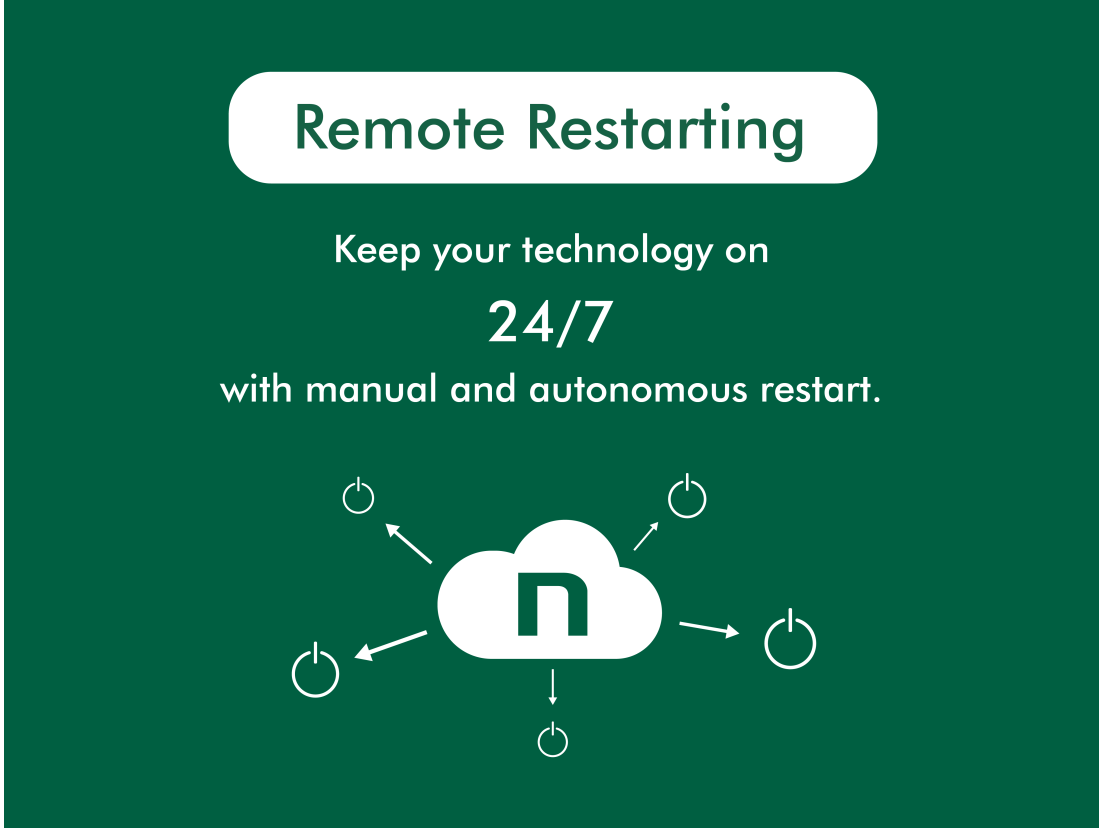
A remote reboot (remote power cycling) involves performing a cold start where the device is turned off and then turned back on by interrupting the power supply, commonly known as power cycling.
Typical remote rebooting products
- TV screens
- Self-service kiosks
- Airport Check-in Kiosks
- Digital signage
- Satellite tuners
- Multimedia players
- Audio systems
- Video walls
- Vending machines
- Information Desks
- and more
NETIO Remote reboot methods
- Manually: NETIO Mobile App
- Manually: NETIO Cloud service (Web interface)
- Manually: switching the output on the web of the PDU device
- Automatic: Power watchdog (power drop detection)
- Automatic: PING WatchDog (detection of connection failure)
- Periodically: Restart at a specific date and time
- Locally: Button or switch connected to DI input of NETIO PDU
9 Benefits of remote rebooting with NETIO PDUs
With the increasing reliance on internet-connected devices and cloud-based operations by businesses, the demand for remote reboot devices has grown significantly. Some systems, like AV systems, are not designed to function continuously for extended periods without human intervention. Remote power rebooter, such as NETIO PDUs, enables network administrators to reset devices or reboot systems without the need to be physically present. This reliable service of remote restarting not only saves time but also enhances IT efficiency. In this article, we will delve into the significance of utilizing remote restarting devices for your system.
1) Save time and money (no traveling)
Remote rebooting devices can save you time and money by eliminating the need for costly on-site visits to reset equipment. It is useful when the equipment is in a hard-to-reach location or another city (country).
2) Improved Uptime
Downtime can be expensive and damaging to your reputation.
Remote reboot devices allow you to quickly reset equipment, reducing downtime and getting your systems up and running in minutes instead of hours or days.
3) Greater control and flexibility
With remote reboot devices, the network administrators have more control and flexibility. You can reboot equipment or reset devices from anywhere, anytime, without physical access. The remote reboot is possible even from your mobile phone within seconds. It simplifies management and maintenance, especially if you have a distributed workforce or multiple locations.
4) Enhanced Security
Remote reboot devices elevate network security by eliminating the need for third-party technicians or contractors to access your equipment. That reduces the risk of unauthorized access or tampering. NETIO Cloud service ensures your remote restarting is encrypted and secure.
5) Simplify routine maintenance
Routine maintenance tasks, like firmware updates or system reboots, can be time-consuming and disruptive. Remote reboot devices simplify these tasks by allowing you to reset equipment remotely. So, you can perform maintenance during off-hours, minimizing the impact on your business.
6) Defined state after power outage
NETIO helps prevent undefined situations by providing a defined start for all on-site technologies. The PowerUp Sequence feature on each output prevents peak overload on UPS or electrical breakers.
7) Platform Independence
NETIO is popular due to its platform independence. You can control power outputs from the PDU website, a mobile app, or third-party systems. You can also use various protocols like secured HTTPS or zero-secured raw Telnet. NETIO supports integration with over 40 different systems/platforms (Control4, Crestron, RTI, BrightSign, UTELOGY, ...). Some NETIO PDUs allows control of defined outputs through external physical switches or temperature sensor.
8) Power connector independence
NETIO offers a variety of power output types (110/230V) and compatible devices with different form factors. These include terminal blocks for DIN rail, PDU devices for 19" mounting, or standard wall socket outputs (European or American). You can combine rack-mount PDUs with FLAT PDUs for TV restarting in one remote power control system.
9) Energy saving usage
NETIO PDUs can be combined with energy-saving practices, such as turning off information kiosks overnight or activating meeting rooms only when someone is present. Remote restarting devices can support these power-saving applications.
In summary, remote reboot PDU devices are essential for system administrators. They save time and money, improve uptime, provide control and flexibility, enhance security, simplify maintenance, and are applicable across multiple locations. By investing in remote reboot (restarting ) devices like NETIO, you can ensure the smooth and efficient operation of your system, even when you cannot be physically present.
